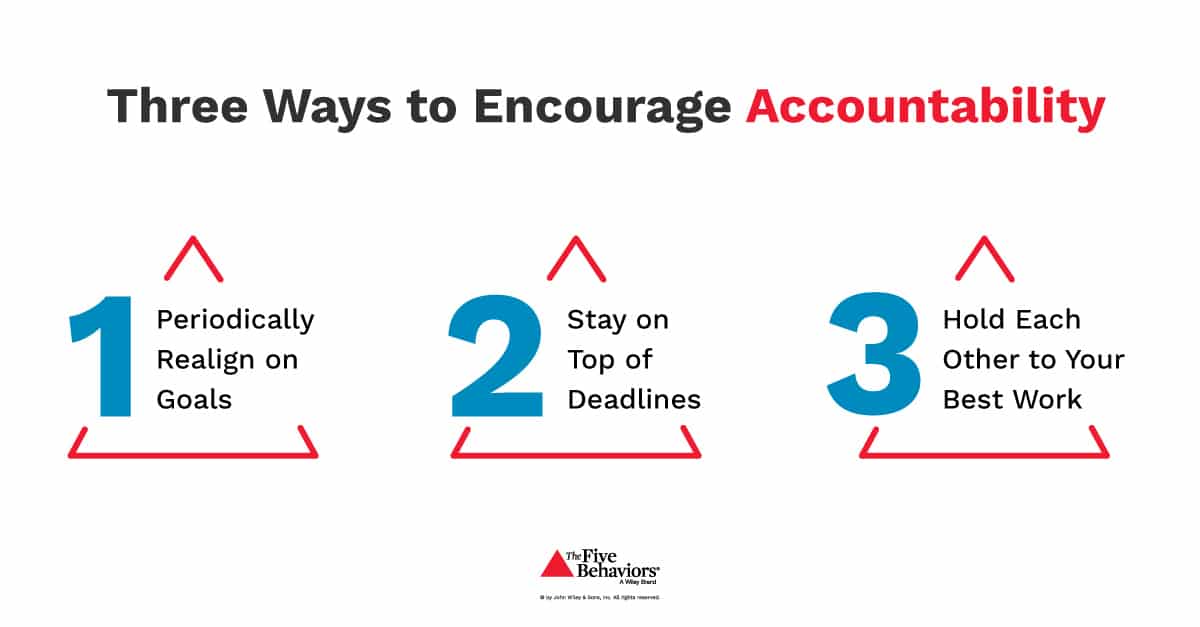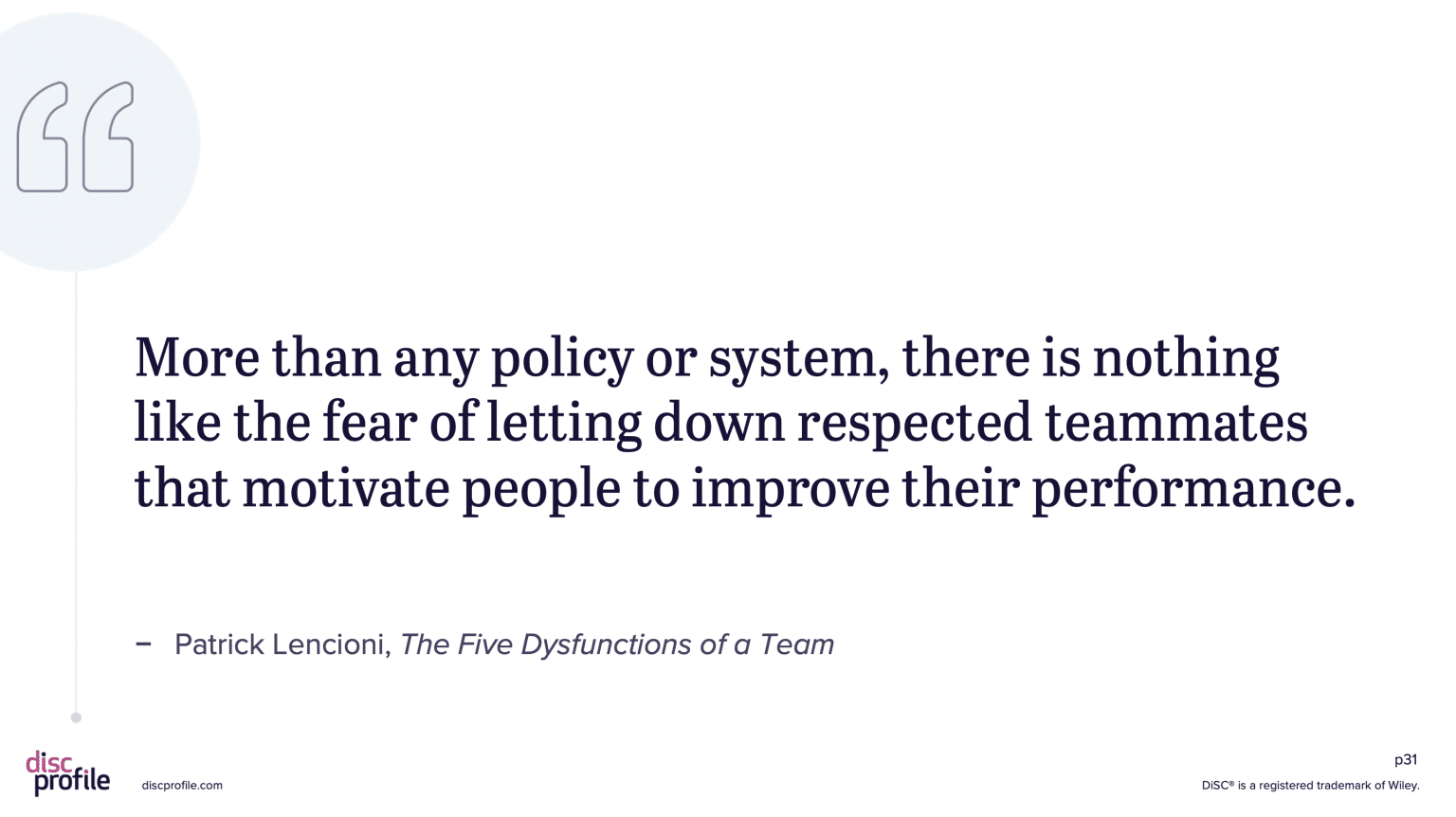Holding Yourself and Others Accountable at Work

Key Takeaways
- Holding yourself accountable and holding your peers accountable are two crucial teamwork skills.
- Accountability is difficult for many reasons, from fear of hurt feelings to unclear expectations.
- Peer-to-peer accountability will improve with practice. Get in the habit of speaking up about problems, being open to feedback, and focusing on solutions rather than blame.
If your job required you to spend 45 percent of your workday making balloon animals, you would surely learn how to make balloon animals. You would at least watch a few YouTube videos to get the basic skills down.
Studies show that high-performing individuals spend 45 percent of their workday collaborating. Yet it is rare for teamwork skills to get the same attention that individual skills do. Assessing and improving your own teamwork skills is a great way to increase your contributions at work. With some practice, you can become the person everyone likes collaborating with.
This article is the fourth in a series on how individuals can build teamwork skills. (See the first article on trust, the second article on conflict, the third article on commitment, and the fifth article on results.) We’re using the Five Behaviors® model developed by Patrick Lencioni.
What does “accountability” mean in the Five Behaviors model?
The Five Behaviors® Personal Development defines accountability as “the willingness of team members to call their peers on performance or behaviors that might hurt the team.”
Teams without accountability may stagnate in mediocrity, miss deadlines, and resent each other for differing standards of performance.
When you’re on a team with accountability, however, you and your teammates feel comfortable offering and accepting feedback. You feel pressure to perform, not just from supervisors but from your peers. Team members confront each other when someone doesn’t follow through on a responsibility.
How does accountability connect to commitment?
If you’re on a dysfunctional team, this kind of useful peer-to-peer accountability may seem like a dream. And true, accountability is not something teams can just switch on one day. Likewise, individuals struggle to hold colleagues accountable for many reasons.
For both teams and individuals, the way to accountability is through commitment.

The Five Behaviors Model
As we discussed in a previous article, commitment comes when there is clarity and buy-in. The Personal Development profile says: “Commitment gives team members the courage to hold one another accountable, knowing that they’re asking their peers to live up to something they’ve already fully agreed to do.”
The Five Behaviors model is shown as a pyramid because the behaviors are built on the foundation of the behaviors that come before them.
Why is it hard to hold teammates accountable?
Practicing accountability often involves some level of interpersonal discomfort, at least at first. Few people relish confronting peers about their behavior. It’s easier just to look the other way or tell a manager.
In addition to a lack of clarity, teams struggle with accountability if they haven’t agreed on ground rules.
Are team members expected to answer emails within a certain time frame? Is it OK to check phones during meetings? Should people be at their desks at certain times, or is the schedule more flexible? Is it OK to message people after work hours?
It probably won’t go well to call someone out for not answering their emails the same day if your team has never set that expectation.
Joe Dumars, NBA player and executive
People struggle to call teammates out for various reasons, depending on their personality style. Some common obstacles:
- They don’t want to “make waves.”
- They fear they will hurt a teammate’s feelings or damage relationships.
- They figure it’s quicker to redo the work themselves than confront their peer about it.
- Their peers haven’t responded well in the past to their constructive feedback, so they figure, “why bother?”
These are both skills that you as an individual can practice. Understanding your natural strengths and weaknesses around feedback will benefit you throughout your career.
Why is it hard to hold yourself accountable?
No consequences
Some people need to have another person checking up on them until they build the habit they want. You can ask someone to help you set midpoint deadlines and check that you reach them.
You might need to know that there’s a consequence for inaction. Choose a consequence that matters to you.
The consequence can be self-administered like no second cup of coffee until you respond to this morning’s calls. Or it could be knowing you’re letting down a friend if you don’t meet them for a working session. The consequence simply has to matter to you.
Promising too much
Do you have a hard time saying “no”? You might need someone to coach you through this issue. I know of someone who has three email templates he crafted with a friend that each say “no” in a different style. Having priorities you can use to justify your negative response to yourself and to others can help.
Perhaps you’re also delivering too much. Maybe you’re seeking perfection when the person asking just wants adequacy. Ask questions of those who make requests. Make sure they and you know exactly what you have committed to.
Are you willing and prepared to take on everything involved? Can some tasks go to others? Are you the best person to ask? Sometimes this type of review will make it easier to say yes to what you can and to say no to what you should.
Unclear or conflicting expectations
Do you have a clear understanding of what you’re accountable for? Does it match what your manager and team members think is your job?
If you’re not certain, this can make it easier for you to delay, or pass blame, or engage in other nonproductive behaviors. Or it can cause you to freeze up, wondering if you’re stepping on someone’s toes or duplicating efforts. Ask for clarity and alignment.
Unpleasant tasks
There’s no avoiding that we all have to do things we don’t enjoy. However, there are different ways of looking at those tasks.
Can you break the task into smaller bits and reward yourself for each achievement? Can you do the tasks with another person? Would doing the job at a different time or different location make it more enjoyable?
You can try if-then planning. (If it’s 11 a.m., then I will stop what I’m doing and work on this task until lunch.) If you have a specific plan, you’re more likely to follow it.
Stress
The side effects of stress can show up in many ways and might be contributing to your accountability problems. If you need to confront someone, bring up a difficult topic, or say no to a persuasive person, you’ll naturally feel some stress. So plan for it and how you’ll address it.
If you’re feeling overwhelmed, try reframing how you look at events. Is there only one way to look at the issue? Are you the only one who can respond to it? Is this really a priority? Is it OK not to have a solution yet?
Entitlement
Perhaps you feel that your title means that it is OK to be late to a meeting. Maybe you even think it reinforces your status when meetings don’t start until you arrive. Perhaps you’re just used to people agreeing with you or giving you a free pass on poor behavior. Or maybe the rules of this group’s culture don’t grant you the same status as a past group’s rules.
Are you holding yourself to the same standards of accountability as you are holding others?
Disorganization
Maybe your problem is an inability to sustain focus on the task at hand. Maybe you’re easily distracted. You may need to make changes to your office to help with your concentration.
Or perhaps you're navigating ADHD or other realities that affect your ability to focus, and your action step is to find support.
How to get better at accountability
Accountability is a shared responsibility, but there are individual habits you can develop to make sure you’re doing your part. Modeling good accountability practices often encourages others to follow suit, as well.
To get better at accountability, try these behaviors:
- Speak up about problems.
- Go directly to the people involved.
- Show that you are open to feedback.
- Be mindful of how you offer feedback.
- Recognize when a teammate’s approach is just different, not wrong.
- Focus on solutions, not blame.
- Follow through on your commitments.
- Notice where you tend to drop the ball.
- Build on your strengths.
The Five Behaviors Personal Development assessment will give you a personalized plan for developing better accountability habits. Some general recommendations are below.
Speak up about problems
Remember that even though it may be uncomfortable to speak up, it helps your team and organization. It is almost always easier to address problems early on, before they become bigger. If you lack the courage to speak up, you’re denying your teammates the opportunity to improve or to address your concerns.
Go directly to the people involved
Instead of complaining to colleagues or relying on managers to intervene, start a conversation with the person who is the source of the issue.
Show that you are open to feedback
Receiving critique is difficult for a lot of people. Maybe your instinct is to defend yourself when your peers hold you accountable, or maybe you totally shut down. Try to listen to feedback with an open mind. In your body language and response, show that you are grateful to your colleague for speaking up.
You can go away and think about it, and if you don’t agree with their input, you can open that conversation. But take time to process and consider their words before reacting with defensiveness or spiraling into self-doubt at the thought you’ve let someone down.
Be mindful of how you offer feedback
When delivering feedback, some people are attentive to feelings, some are attentive to logic, and most fall somewhere in between. Many of us default to delivering feedback in the way we’d like to hear it.
Tune in to the needs of your teammates as you balance gentleness and firmness. People may be more open to what you’re saying if you speak tactfully and with care for their feelings. However, you also have to be sure that you’re not downplaying your concerns to do so. Conversely, a blunt, logical approach may feel most efficient and honest, but some teammates may close off if your edges are too sharp.
Recognize when a teammate’s approach is just different, not wrong
There’s usually more than one good way to approach a project. Depending on your personality, you may feel the urge to critique a colleague doing something in a way you wouldn’t do it. But take a second to analyze whether their way is truly inefficient, or whether it’s just different.
Focus on solutions, not blame
Concentrate your criticism on the task rather than the person. Show faith in their capability, and discuss how to move forward in a better way.
Follow through on your commitments
As you practice holding others accountable, make sure you’re shining some of that light on yourself. Be proactive in letting teammates know about possible issues so you can all discuss solutions together. Recognize what obstacles tend to stand in the way of you doing what you said you’d do.
Notice where you tend to drop the ball
Identify where you’re having significant problems. Ask others to help you with this.
You might see logging into work at 8:10 instead of 8:00 as insignificant, but it might be the top accountability issue your manager identifies. Or you might be worried about a project-specific task, but by checking in with others you discover that the team is more concerned with how long it takes you to reply to their emails. Get clear on where you want to be more accountable.
Identify a few behaviors or routines that aren’t showing you at your best. Take on one or two closely-related behavioral issues so you aren’t overwhelmed. These should be behaviors you know you can change and you know are a problem.
Build on your strengths
People of all personality types have natural strengths around giving and receiving feedback. The Five Behaviors Personal Development assessment can help you understand your own. These strengths are a great foundation to build from. For example,
- If you’re naturally diplomatic, teammates may be more receptive because of your gentle approach.
- If you’re naturally objective, you can help team members realize that constructive criticism is healthy, rather than a personal attack.
- If you’re naturally goal-oriented, you’re likely to initiate difficult but necessary conversations to ensure success.
- If you’re naturally encouraging and enthusiastic, you can spur team members on to improve performance.

Be the teammate everyone wants to work with
Whether you’re part of one long-standing team or someone who works across various short-term teams, you can benefit from a teamwork skills tune-up. By focusing on your own part of the team dynamic, you’ll build teamwork muscles you can bring to any team.
In the next article, we’ll look at how embracing accountability sets you up for success with the final of the Five Behaviors: results.

Free slide decks to download: Quotes on Accountability and Quotes by Patrick Lencioni
Posted 09/08/2022







